May 31, 2025 | 07:38 GMT +7
May 31, 2025 | 07:38 GMT +7
Hotline: 0913.378.918
May 31, 2025 | 07:38 GMT +7
Hotline: 0913.378.918
The agricultural sector and localities are concerned about the current problem of forest rangers shortage. Meanwhile, a worrying problem today is that the forestry profession is no longer attractive to the young generation because of the specific nature of the job, the remuneration mechanisms, and policies. At universities of agriculture and forestry, recruiting students for the forestry major is increasingly problematic, and the number of students majoring in this field is increasingly absent.
Assoc. Prof. Dr. Nguyen Quang Ha, Rector of Bac Giang Agriculture and Forestry University shared: In 2014, the school started to include a major in forest resource management (rangers) into the training program. From 2014 to 2018, on average, the school enrolls 1 class each year with several students from 15 to 20 people. However, from 2018 until now, the school has not been able to open a class due to lacking students.

Bac Giang Agriculture and Forestry University. Photo: TL.
“The school plans are to enroll a class of 20-30 students majoring in forestry each year. The enrollment is organized by the school methodically and drastically, the scope of enrollment is not only in the plains but also in the mountainous provinces. Admissions officers used all methods and channels of information but still did not succeed," Mr. Ha sadly said.
According to Mr. Ha, the main reason for inefficient enrollment is that this field of study is no longer attractive to learners. Among sectors, the attractiveness of the agricultural sector is inherently low. In the agricultural sector, the forestry sector ranks at the bottom in terms of attractiveness, so difficulties are piling up.
Mr. Ha analyzed: In reality, students graduating from high school tend to have clear distinctions. Mr. Ha analyzed: In reality, students graduating from high school tend to have clear distinctions. Those with low education or family orientation who do not attend university, immediately apply for a job as a worker in industrial parks, factories, …
The second group is those who want to be professionally trained and choose to go to university or college. However, most will choose industries that are easy to get a job with and have better working conditions such as industries related to economy, industry, and services.
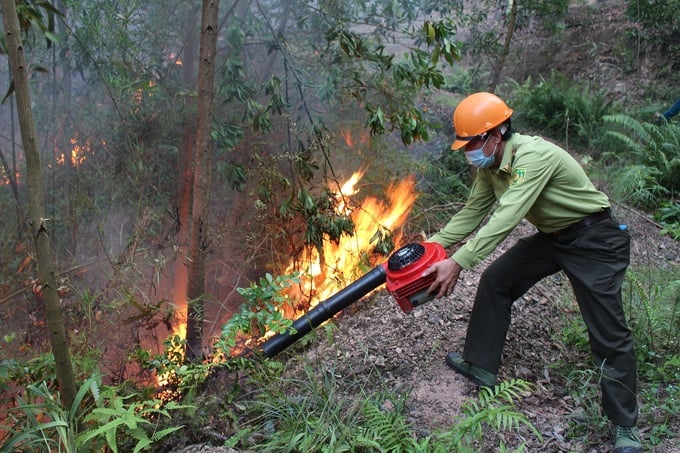
It is increasingly difficult for the forestry sector to recruit quality young human resources. Photo: TL.
The proof is that in recent years, the number of students enrolled in the school's majors has mostly concentrated in majors such as Chinese, accounting...while very few even to no students are enrolling in ranger studies.
“It is very sad when an agro-forestry training school does not have students registered to study agroforestry, while other majors are very crowded. To maintain the faculty's activities and retain teachers, the school had to send staff to do research and projects.
Income is one thing, but being a teacher requires students, if teachers keep waiting for students, everyone will eventually be bored. There are still really enthusiastic people who always believe that this field will regain its original position. But if the situation continues, it will demoralize their belief.”, Assoc. Prof. Dr. Nguyen Quang Ha confided.
In the same situation, the Vietnam National University of Forestry is a school with a long tradition of training forest rangers. However, in recent years, the school's recruitment and training work is also facing many difficulties when the number of students enrolling is decreasing sharply.
Mr. Ha Van Huan, Head of Training Department (Vietnam National University of Forestry) informed: Since 2015, the school has enrolled 820 students to study forestry, and the number of graduates is 1,396, a modest number.
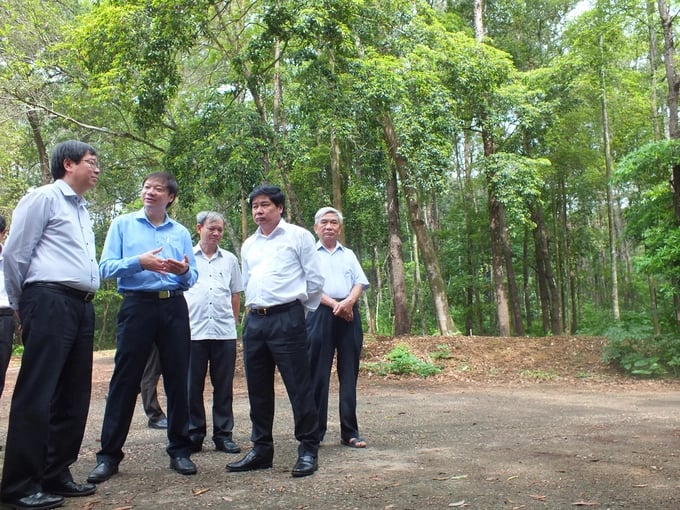
Deputy Minister of MARD Le Quoc Doanh (second from right) during a visit to the university. Photo: Le Ben.
The school's enrollment is carried out according to the university enrollment regulations of the Ministry of Education and Training, the enrollment form is very diverse and flexible such as Reviewing transcripts, using test scores, low entry scores...In addition, the school applies many policies such as tuition fee exemption and reduction (in case of paying, the tuition fee is very low), dormitory fees, scholarships… However, the number of students enrolling is still decreasing year by year and often falls short of the set targets.
According to Mr. Huan, the reason for the decrease in the number of students enrolled over the years is the decreasing attractiveness of the field of study. Instead of choosing a profession that mainly works in the mountains and forests, with challenging, dangerous, and strenuous conditions, most young people choose a major to stay in the city.
The direction to enroll students who were born in that land and want to stick with their homeland is very positive. However, places with special-use and protection forests are often remote and isolated areas, and the surrounding residents are mostly ethnic minorities. Finding young people who love their jobs and have the right qualifications and skills to do their jobs is not an easy task.
According to Mr. Ha Van Huan, there needs to be a change to make a breakthrough in enrollment and attract forest rangers. The forestry sector is a relatively specific industry, so it must have a specific mechanism. Forest rangers play the role of protecting national resources and the ecological environment. In border provinces, forest rangers also play an important role in protecting national security.
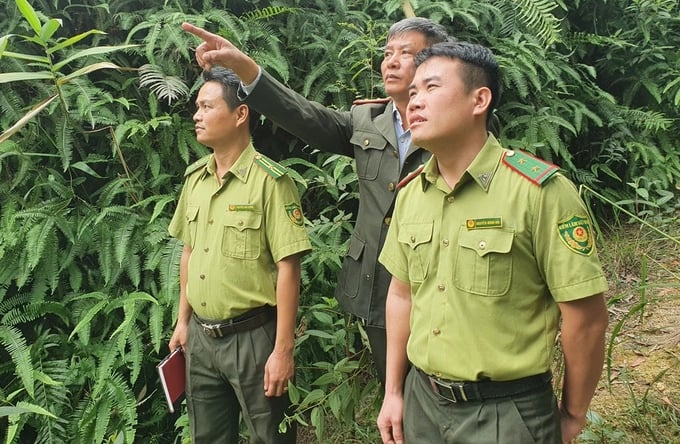
The forestry industry is relatively specific, so there must be a specific enrollment, training, and recruitment mechanism. Photo: TL.
Therefore, it is necessary to raise the social status and have a job arrangement mechanism for students after graduation similar to the police and military sectors to attract learners.
“The current inadequacy of forest rangers is a state civil servants, special jobs such as police and army, but enrollment and retraining follow the market mechanism. If this changes, the major will attract a large number of people, and people will even compete with each other in the industry. Consequently, people who love, are passionate about, and stick with the profession for a long time can be identified" said Mr. Huan.
Another solution, according to Mr. Huan, is that localities can consider building a long-term plan, and calculate how many forest rangers will be needed in the near future. Then they could conduct recruitment in the locality according to the needs and then send people to the training school, upon graduation, arrange jobs for the selected people. On the contrary, those participating in this program will have commitments and agreements with the localities. This will ensure the balance between the supply and demand of human resources.
“This form is training according to actual needs, not the current free-floating training. This approach will solve the root of the problem, both attracting learners and ensuring enough human resources for localities. Of course, there will be initial difficulties when implementing it, but with determination, it is possible", Mr. Huan stated.
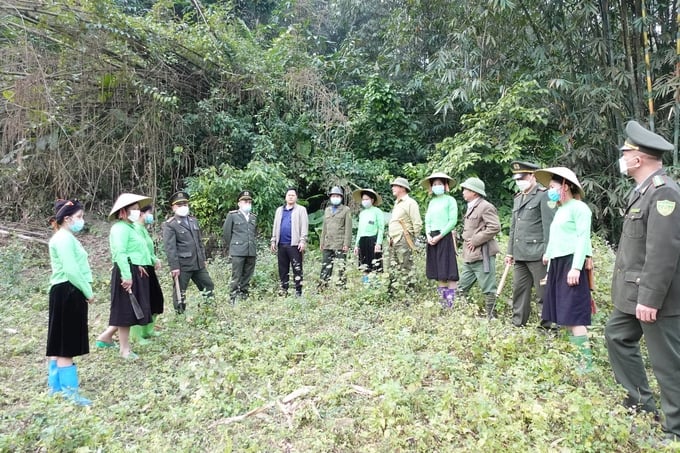
It is necessary to study the mechanism of ordering training for forest rangers. Photo: TL.
Assoc. Prof. Dr. Nguyen Quang Ha, Rector of Bac Giang University of Agriculture and Forestry, said: The fact that many forest rangers are no longer interested in the profession is due to the difficult income and living standards. Therefore, the first thing to do is to have mechanisms and policies to improve living standards for forest rangers, helping learners see that their future jobs are not only for money but also for hobbies and passions.
The government should consider forest resource management as an important area because it is related to the health of the nation, improving the living environment… and having worthy investments in human resource training for this industry.
In addition, increasing income from forests and improving the lives of forest rangers are necessary. Each area associated with natural forests has the opportunity to improve, and the development of non-timber forest products is completely possible. However, the implementation must be based on the actual situation in each specific area and project, not in general.
The most important factor of the forest is the impact on the ecological environment, which does not bring economic value. There is a policy of paying for forest environmental services and selling carbon certificates… though the revenue is not significant.
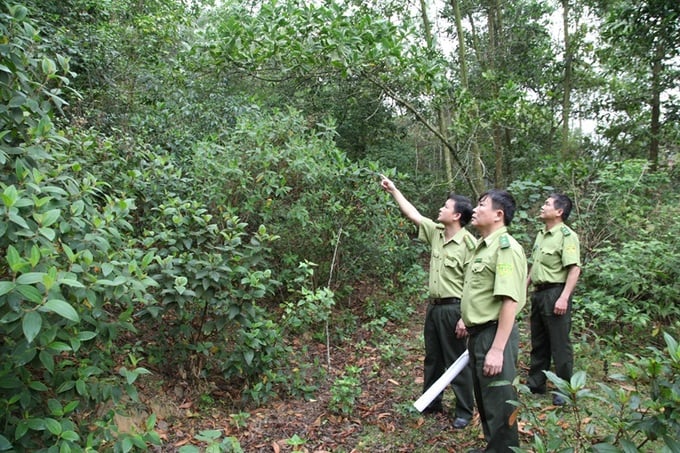
The improvement of living standards for forest rangers is a necessity today. Photo: ST.
“In the long run, if we keep the policy of closing the forest, there is nothing attractive about forestry. We must understand that simply keeping the forest does not need an engineer. While protecting forests and national resources, and associating forests with economic and social development in remote and isolated areas require qualified people. It is this human resource that we are lacking”, Mr. Ha analyzed.
"Businesses must participate in the human resource training process. Currently, businesses still think in the old way: The training of human resources is the job of the school, the society, after training is completed, recruiting, even businesses that come to the school to recruit students are also grateful. However, this is a story from many years ago. Now we can't do that anymore, businesses have to work with the school to enroll and support students to study from the beginning."
Translated by Hoang Duy

(VAN) Several scientists and farmers are experimenting with soil treatment in some key durian-growing regions such as Cai Lay (Tien Giang), Dak Song, Gia Nghia, and Dak R’lap (Dak Nong).
/2025/05/25/4127-3-073637_820.jpg)
(VAN) Thanks to the promotion from an FAO-implemented project, vegetable production in greenhouses in Moc Chau has seen strong development, from 1.5 hectares in 2021 to nearly 50 hectares in 2024.

(VAN) FAO has recently supported USD 140,000 to implement the project 'Risk mitigation human-animal interface risks through disease control initiatives in pig farming.'

(VAN) The People's Committee of Tra Vinh province has approved an adjustment to the investment policy for the Green Hydrogen Plant project, increasing its area to approximately 52.76 hectares.
![Reducing emissions from rice fields: [2] Farmers’ commitment to the soil](https://t.ex-cdn.com/nongnghiepmoitruong.vn/608w/files/news/2025/05/05/dsc08881jpg-nongnghiep-140632.jpg)
(VAN) Clean rice cultivation model in Thuong Tan commune, Bac Tan Uyen district, is assisting local residents in achieving sustainable agriculture by substantially reducing costs, increasing productivity, and protecting the environment.

(VAN) At the conference to disseminate Resolution No. 68, AgriS introduced its digital agricultural ecosystem and reaffirmed its commitment to accompanying the Government in promoting private sector development and sustainable agriculture.

(VAN) 'Blue Ocean - Blue Foods' initiative is designed to restore marine ecosystems and establish sustainable livelihoods for local communities by cultivating a minimum of 1,000 hectares of cottonii seaweed in the first three years.